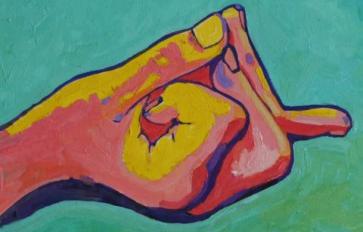
If you practice yoga, you’ve likely heard of Patanjali’s Yoga Sutras, a foundational text of classical yoga philosophy. Maybe you’ve even read it.
If you have, you’ve encountered a collection of densely packed aphorisms that appears deceptively simple. However, the Sutras’ brevity also adds to its occasional impenetrability. Patanjali wrote the text for his peers, advanced yogis who didn’t need the practice of every yama and niyama spelled out for them. Today, the paucity of specifics in the Yoga Sutras has generated a multitude of commentaries to help readers find current relevance in a text written around 400 CE.
Jumping into the fray is Stephen Cope, Founder and, at the time, Director, of the Kripalu Institute for Extraordinary Living. In The Wisdom of Yoga: A Seeker’s Guide to Extraordinary Living, Cope elucidates this notoriously difficult text with a new strategy, the use of modern-day characters—a lawyer, a retired dancer, a novelist, an interior decorator—to demonstrate Patanjali’s theories in action. It’s an unconventional and effective approach, showing how Patanjali’s insights are just as timely today as they were over a thousand years ago.
The ancient yogis were preoccupied with the same questions as seekers today: How do we live our best lives? What are the roots of suffering? Patanjali’s guidance on these matters can bring to mind the “yogi athletes” for whom he wrote, disciplined seekers living a relatively austere life, isolated from society and spending hours each day in meditation. It can be hard to fit our modern selves into this picture.
One of Cope’s gifts is his assurance that we can all achieve the “liberation” promised by Patanjali, and we don’t have to quit our jobs to do it. “Patanjali views every aspect of living as an opportunity for practicing wisdom,” Cope writes, and we can engage with his principles while we’re “getting meals for the kids, and doing the laundry, and getting to work.”
Cope’s characters are based on real people, and the interlinking narratives on real events. We meet Jake, a handsome lawyer, who has just lost a huge case for his firm, and for whom happiness always seems just out of reach. We follow Maggie, a native New Englander from a formerly prosperous family, as she writes her fourth, likely to be unpublished, novel. Susan, an interior designer, is a member of Overeaters Anonymous and a devotee of traditional western psychotherapy, but she hasn’t found relief from her compulsive eating, and Kate, a dancer forced to retire due to injury, watches her life crumble as its foundations are revealed to be lies she’s spent a lifetime telling herself. Rudi, perhaps furthest on the path to enlightenment, is a local gardener and handyman. The author himself appears as a character. He has just returned to his job teaching yoga and meditation at Kripalu after a six-month sabbatical, and he’s frustrated by his lack of progress on the book he’s writing, a beginner’s guide to the Yoga Sutras.
Each character transforms in a way that’s realistic and relatable. Their stories are genuinely inspirational because you can imagine the same kind of transformation happening to you, if you live by Patanjali’s wisdom.
If you’re looking for yoga philosophy, you’ll find it here, but the philosophy is always in service to practice. The Wisdom of Yoga isn’t intended to be a companion guide or academic commentary. Cope is concerned with how to apply the theory. There’s guidance regarding how to meditate, how to develop a mantra practice, how to conquer cravings, how to increase concentration, how to stop deluding yourself, how to breathe. Ultimately, it’s a guide to train “a reliable sense that everything really is OK.”
The Yoga Sutras promise nothing short of liberation, “freedom from all the sources of conditioning that bind us to small ways of thinking and being.” Cope convincingly demonstrates how we can understand the concept of liberation in a way that makes it achievable for all.
There are few books I would recommend to every yoga practitioner; this is one of them. Whether you want to stop eating compulsively, learn to meditate, or find God, Patanjali has the blueprint, and Cope and his characters are adept guides.








